- Home
- Michael Crichton
Venom Business Page 17
Venom Business Read online
Page 17
Raynaud decided to call him. He jotted down the serial number on the gun and went to the phone. As he did so, he glanced at his watch and noted that it was time to change. The International Congress of Zoologists and Herpetologists would be opening in another hour.
“Friends, members of the committee, fellow students of zoology,” said the voice. It echoed through the long hall, amplified by a dozen loudspeakers, ringing over the heads of the four hundred delegates seated at the long tables facing the podium.
“It is, ah, a great pleasure to welcome you here to our latest conference. I trust that it will be an exciting and profitable experience for us all.”
The speaker cleared his throat, the sound resounding through the hall. In the back, Raynaud stood leaning against the wall, thumbing through the program. It looked ghastly dull. The afternoon sessions, for example, dealt with such fascinating topics as “Zoo Hygiene,” “Mating Techniques of the Captive Lion,” “Normal Variations in Rectal Temperature of the Crocodile,” and “Kangaroo Psychosis: Report of Case.” He flipped through until he found what he was looking for, the panel on herpetology. It met after dinner, and considered four papers on reptiles and snakes.
The main speaker rambled on, and Raynaud walked out. Ranged around the central auditorium were several corridors filled with exhibits and displays. Half the delegates, not bothering to attend the keynote address, were out here, moving from booth to booth.
As always, he was struck by the International Congress. It was largely a zoo-keeper’s meeting, and zoos, though no one could suspect it, were big business. A large urban zoo might easily have an operating budget of two million dollars a year, and throughout the world many zoos were expanding. There was growing interest in “natural habitats,” in infrared rooms for nocturnal animals, in complex aquaria. All this meant money.
But there was a scholarly side to the International Congress, since it served as a convention for veterinarians as well. Obscure diseases of obscure animals were debated and fussed over by eminent men, long into the night.
And finally, there was a purely commercial aspect to the Congress. Pet food companies, manufacturers of antiseptics, vitamins, and animal cages were all represented—as were the drug companies. About five years ago, a number of drug companies had begun to realize the market for large volume drugs which existed among zoologists.
For example, if one of your captive elephants was acting up, he would require a quart or two of tranquilizer to calm him down. A lethargic gorilla might need several bottles of amphetamine before he perked up.
There was also the business of venoms and anti-venom. Drug companies here were both buying and selling; buying from the snake farms, producing their anti-venom, and selling it once again after processing.
Anti-venom. Purified extracts. And a variety of research compounds used in pure biochemistry, neurology, and so on.
Raynaud walked among the booths, casually looking over the displays and products offered for sale. He stopped to talk with a salesgirl wearing a microskirt about a new snake-noose with a spring-loaded attachment.
And then, looking up, he saw Jonathan Black.
The bald head, the beak nose, and fleshy face were unmistakable. Black was discussing something with a salesman at Valdez Chemicals’ booth. Raynaud frowned. Valdez was a new company, based in Chile. It had been in business only a few years, but it had a reputation for aggressive research, and even more aggressive marketing. A variety of products had come from the Valdez labs, some of them good, some of them bad. A vaccine against the monkey SV-38 virus, for example, had killed dozens of monkeys before it was learned the vaccine was impure, and contained live virus.
He waited, looking at Black, wondering whether he should go over and say hello. He decided not to; after another five minutes Black finished talking, reached into his wallet, and gave the salesman some money. The salesman, smiling, gave Black a small vial of chemical, and Black walked off.
Raynaud went over to the booth.
“I say,” he said, in his best English accent, “have you seen a tall fellow, heavyset, a bit balding?” Raynaud gestured, describing with his hands.
“There was one just here.”
“Oh? Was there? Then he must have already bought it.”
The salesman said, “Yes, he—”
“It was the Viliran, I take it?”
Viliran was Valdez’ most widely sold product, an antiseptic for cleaning monkey cages. Many research groups used it.
“Viliran? No.” The salesman looked confused.
“You must be thinking of the wrong man,” Raynaud said. “I mean Doctor Jonathan Black, the neurophysiologist. He said he was coming here to try Viliran. We hear it’s marvelous stuff.” Raynaud said, “You see, I work in Doctor Black’s lab with him.”
“Ah.” The salesman nodded. “Well actually, I was describing several of our products to him, and he became quite interested in another of them.”
“Oh?”
“Yes. A new experimental compound called Dezisen.”
Raynaud frowned. “Dezisen? I don’t think I know it. Has it been reported in the literature?”
“Only preliminary work,” the salesman said, “but allow me to give you these reprints.”
He handed Raynaud several journal articles.
“Dezisen,” he said, “is our name for the compound beta-amino-three-five-caphrophane. It is the form with the amide at the meta-position, and it possesses several interesting properties. Originally, we extracted the compound from the venom of tarus kernictus, the African peddle viper, but we have recently synthesized it de novo and can offer a purified extract.”
“I see,” Raynaud said.
“Furthermore, by moving the amide to meta-position from the para-position, which we do by a process of low pressure acetylation, we have made the drug active p.o.”
“Excellent.”
“This offers a number of advantages over the injectable form, in terms of ease of administration. Any laboratory technician can now give the drug on a regular schedule. And none of the potency is lost. All the thalamic inhibitory effects described in those papers there”—he tapped the articles he had given Raynaud—“are retained, and to a degree which is quite striking. We at Valdez have little doubt that Dezisen will open whole new areas of neurological research. We are now working, naturally, on a drug which will counteract Dezisen. A drug which has the opposite effects. Such a drug would be, of course, a great benefit to mankind.”
“Absolutely,” Raynaud said.
“Your friend has already purchased two grams,” the salesman said, “so I don’t suppose you’ll want more. But if you do, you can reach me here, at this address. Call any time.” He gave Raynaud his business card.
As he was leaving, he ran into Porton Lewis, who was wearing a red flannel shirt and dirty khaki pants. Porton Lewis was an Englishman who had left home at an early age, after deciding he did not want to be a barrister after all, and bad settled in Nicaragua. He always wore flannel shirts and khaki trousers, as nearly as Raynaud could tell.
“Hullo, Charles,” Lewis said. “Fancy you here.”
“Fancy you,” Raynaud said. “Visiting the old country?”
“I thought it would be amusing,” Lewis said. “Besides, I’m selling.”
“What?”
“Fifty grams of venom from the trichus licanthus. Very rare, that. Nobody has an anti-venom for it yet, and the drug companies are mad for me. Buy you a drink?”
“Of course.”
They went to a nearby pub. Lewis saw the reprints under Raynaud’s arm.
“What’ve you got there?”
“Stuff from Valdez.”
“Yes. They’re still aggressive as ever. Very pushy, for a drug firm. What’s it on?”
“This stuff Dezisen.”
“Christ.” Lewis sipped his drink. “I heard about that. It’ll make Valdez rich, it seems.”
“Why?”
“Every chemical and biological warfare
group in the world wants it. The early bids are already ranging in the millions of dollars.”
“Why?”
“Because Valdez now has an oral form. That’s the key, you see. Everybody has known about this venom extract for a couple of years. But nobody figured out how to make it in an oral form. Now, you can just spray it into the air, and let it hit an army. Wham! End of war.”
“You think so?”
“It’s logical,” Lewis said. “Considering the effects. In animals, it’s pretty clear. One dose and you get uncontrollable rage. A pure, blind reaction. Turns a normal man into a vicious beast: at least everyone assumes it does.”
“It hasn’t been tried yet?”
“No. Not yet.”
“Apparently it’s available,” Raynaud said, “to research groups.”
“Yes. In limited doses. For animal experimentation, of course.”
“Of course,” Raynaud said.
When he returned home to the apartment the telephone rang. It was his friend Longwood, calling from the police.
“I traced that gun for you,” Longwood said.
“And?”
“It belongs to someone named Richard Pierce. Do you want the address?”
“No,” Raynaud said. “Never mind.”
6. A MEETING OF TRUE MINDS
POOR CHARLES, LUCIENNE THOUGHT. He deserved better. She hated to use him, really hated to do it, but there was no other way. She had examined the alternatives before, running over them in her mind, and always she reached the same conclusion.
The poor, poor son of a bitch. She did not like to think of him in prison, or dead. Whereas she rather liked the idea of Jonathan Black in prison.
Or dead.
Jonathan was better off dead. He deserved death, and it saddened her to think that she could not arrange death for him. The best she could do would be twenty years in prison. For Jonathan, of course, that amounted to a life sentence—and a bitter sentence, since he expected to inherit her estate—but still, it was not death.
Jonathan: such a funny man. Always playing such a fierce, intellectual, calculating game. Didn’t he realize he was transparent? Hopelessly transparent? All his petty ruses, his sly little hints meant nothing. She saw right through them.
She lit a cigarette and had taken two puffs when Jonathan strode into the room.
“Lucienne, my dear.”
He bent over her, and kissed her softly on the cheek. She accepted it, then waited.
“Lovely perfume,” he said.
And he kissed her hard on the mouth. She accepted this, too, not rejecting or responding.
After a moment he broke away and looked at her. “A shame,” he said. “It’s gone, isn’t it?”
“Yes,” she said. “It is.”
He sighed, and dropped into a chair across from her. “How have you been?”
“All right.”
“And our friend?”
“Fine.”
“Have you, ah, re-established…?”
“Yes.”
“Marvelous,” he said. “It couldn’t be better.”
She said nothing. She continued to smoke her cigarette. There are times, she thought, when I loathe this man. When I detest his very presence in the same room with me. A big, fat, ugly detestable man.
Seeing him now, she could not imagine why she had ever found him attractive.
“And you gave him the story about protecting Richard?”
“Yes.”
“What was his reaction?”
“He is suspicious,” she said. “I tried to allay his doubts, but the suspicion remains.”
“Perhaps it is just as well. He is not a fool, you know.”
“I know.”
“How much are you paying him?”
“A thousand dollars a day.”
Jonathan’s eyebrows went up. “Rather much.”
“He insisted on it.”
Black laughed. “Good for him.”
“He’ll earn it.”
“Of course,” Black said. “And then, you do not expect ever to pay him.”
Lucienne nodded.
“You know, of course, that he will think of ways to increase his income.”
“Yes,” she said.
“That means Richard.”
“Yes.”
“Excellent. I am certain Richard will pay whatever Charles asks.”
She shrugged. “It does not matter, in any event.”
“I am not sure. It may be a great advantage. I watched Charles closely at dinner. He is a careful, hard man. Out for himself, uncommitted to anything except, I think, money. Richard is not his friend. Richard is in some ways a model and a goal. But they are not friends. Actually, he hates and resents Richard deeply. That should be useful,” Black said.
“How are your other preparations?”
“Proceeding smoothly. All arrangements have been made. Within two weeks, the scandal will break.”
“The women?” she asked.
“Arriving on schedule.”
“And the stock sale? Is it proceeding according to our information?”
“Apparently.”
“Then there are no problems,” she said.
“None. I am considering certain refinements, subtle touches, fine points to make everything more poignant and lascivious. To increase the press coverage.”
“Excellent.”
She smiled. He came over and kissed her again. “Goodbye, Lucienne,” he said. “Be careful.”
“I will.”
“He’s a handsome one…”
She looked at Black and laughed.
7. THE RETURN
“CHARLES, LAD! GOOD TO see you!”
Richard held out his hand as he came into the flat. Raynaud got up slowly, setting aside the Sunday newspapers.
“Just arrived, ten minutes ago,” Richard said. He clapped Raynaud on the back. “How have you been?”
“Fine.”
“Fix us a drink, will you?”
Sandra came in, wearing a pale blue shift, looking cool and very beautiful. But she seemed tired and subdued.
“Hello, Charles. How are you?”
“Fine. Good trip?”
“Yes, very interesting.”
Pierce was walking ahead with the bags, going into the bedroom. “Come on with me, would you, love? Charles is going to make drinks.”
She sighed, and glanced quickly at Charles. “All right,” she said.
Raynaud went to the kitchen and made a pitcher of martinis, pouring straight gin over the ice cubes, not bothering with the vermouth. A moment later Pierce reappeared from the bedroom.
“Hey lad. Did you see her? Doesn’t she look super?”
“She looks great,” Raynaud said, stirring. He poured drinks and handed one to Pierce.
“Hey, lad, you just believe it. That little girl really does the job. Really does it. You know what they say: French girls know all the tricks, and Italian girls know none of them, but Italian girls are better anyway. That little girl gives you the wildest—”
“Keep your voice down,” Raynaud said, looking toward the bedroom.
“Doesn’t matter, she can’t hear. Besides, what does she expect me to talk about? It’s all we did for two days, for Christ’s sake. Meals in the room. Never went out.” He laughed. “By the way, speaking of French girls, guess who’s coming into town? The snapper. I just heard. Remember Dominique? She got a tourist visa—don’t ask me how, but she got one, and she’s coming to London. Ah.” He looked at the ceiling and smacked his lips. “Going to enjoy that.”
“What about Sandra?”
Pierce shrugged. “They needn’t meet. Besides, two days with one bird, night and day, it gets on your nerves.”
“You didn’t enjoy yourself?”
“Enjoy myself? Listen, I got rubbed raw. I was on speed just to keep up with her. I’ll probably sleep forty-eight hours once she leaves.”
He smiled.
“And you, Charles. How did y
ou spend the weekend?”
“With snakes.”
“The convention?”
Raynaud nodded.
Pierce lit a cigarette. He did not look at Raynaud. “And did you meet my stepmother?”
“Yes, as a matter of fact.”
“When? I didn’t see her at the party.”
“She arrived,” Raynaud said, “after you left.”
“Ah.” Pierce nodded and sucked on the cigarette. “You found her interesting?”
“Somewhat.”
“Did you sleep with her?” He flicked the ash on the floor. “You needn’t act surprised. Everyone else has.”
Raynaud hesitated. “It’s none of your business.”
Pierce laughed. “Whatever you say, lad. Did she give you the full treatment?”
“What’s that?”
“About me. About how I’m a disgrace to the family and all that rot. About how I’ve soiled my father’s image.”
“She never mentioned it.”
“Bloody hell. She can’t talk about anything for ten minutes without coming round to me.”
“Don’t flatter yourself.”
“I don’t,” Pierce said. “But I know she’s filled you neck-high with stories about me. About her oh-so-good reasons for hating me.”
“She didn’t say anything at all.”
“Charles, Charles. I know her. I know how she is.”
“I need another drink.”
“We both do. I’ll tell you one thing,” Pierce said. “Any time you want to hear some real stories, just ask. I’ll tell you who’s besmirched the family name. I’ll tell you the whole thing. Frankly, I even think that she killed him.”
“Who?”
“My father. My stepfather.”
“Who did?”
“Lucienne.”
Raynaud said nothing.
Pierce gave him the drink and lit a cigarette. “You think she couldn’t have arranged it?”
“It’s very unlikely.”
“I’m not so sure. They never caught the driver, you know.”
“So?”
“It’s just a feeling.”
“Listen, your friend Doctor Black was in the car the whole time.”
“That’s right,” Pierce said, “but he’s only intelligent. Lucienne is cunning.”

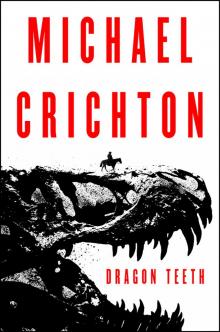 Dragon Teeth
Dragon Teeth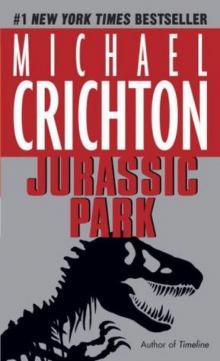 Jurassic Park
Jurassic Park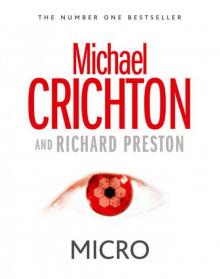 Micro
Micro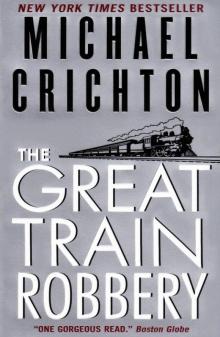 The Great Train Robbery
The Great Train Robbery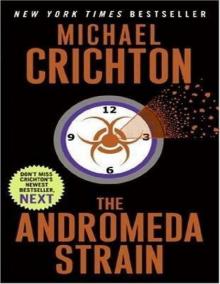 The Andromeda Strain
The Andromeda Strain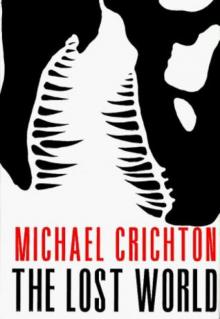 The Lost World
The Lost World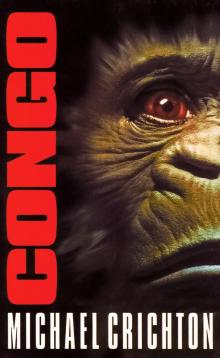 Congo
Congo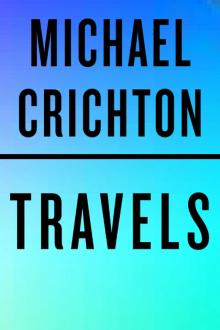 Travels
Travels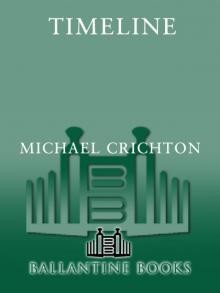 Timeline
Timeline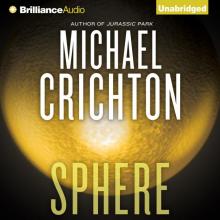 Sphere
Sphere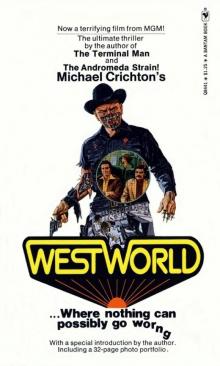 Westworld
Westworld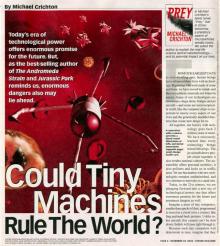 Prey
Prey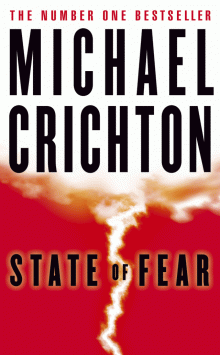 State Of Fear
State Of Fear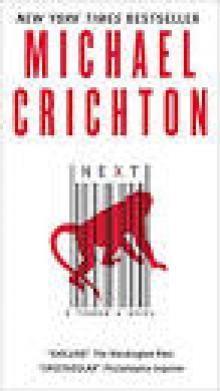 Next
Next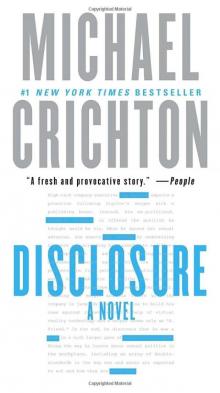 Disclosure
Disclosure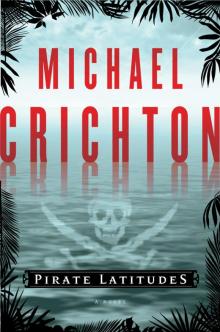 Pirate Latitudes
Pirate Latitudes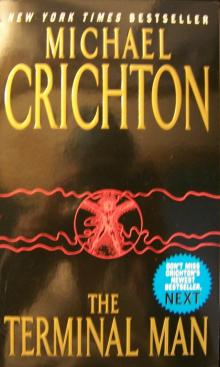 The Terminal Man
The Terminal Man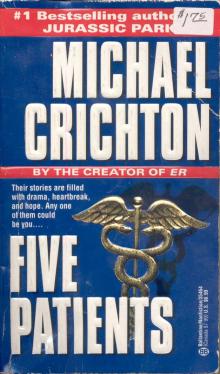 Five Patients
Five Patients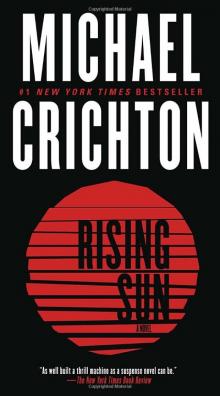 Rising Sun
Rising Sun Binary
Binary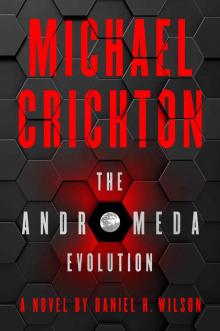 The Andromeda Evolution
The Andromeda Evolution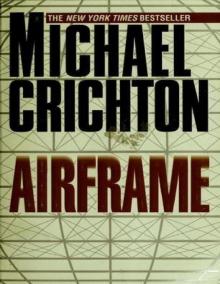 Airframe
Airframe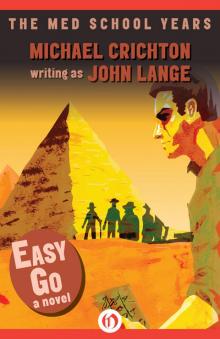 Easy Go
Easy Go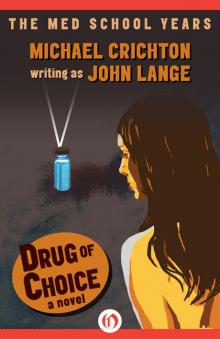 Drug of Choice
Drug of Choice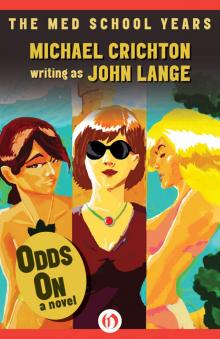 Odds On: A Novel
Odds On: A Novel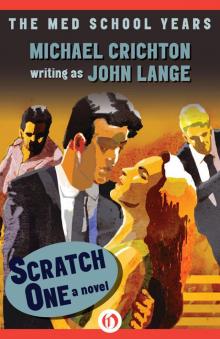 Scratch One
Scratch One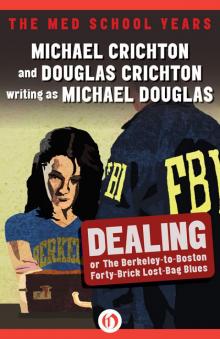 Dealing or The Berkeley-to-Boston Forty-Brick Lost-Bag Blues
Dealing or The Berkeley-to-Boston Forty-Brick Lost-Bag Blues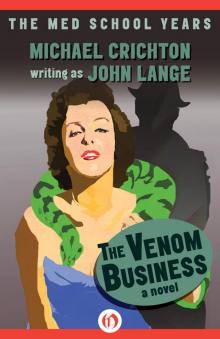 Venom Business
Venom Business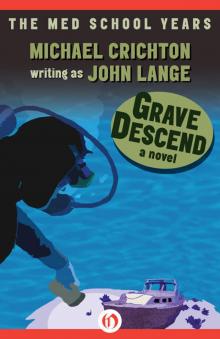 Grave Descend
Grave Descend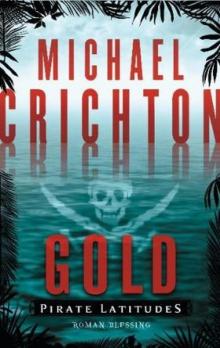 Gold - Pirate Latitudes
Gold - Pirate Latitudes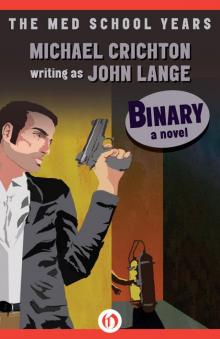 Binary: A Novel
Binary: A Novel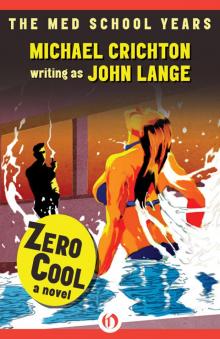 Zero Cool
Zero Cool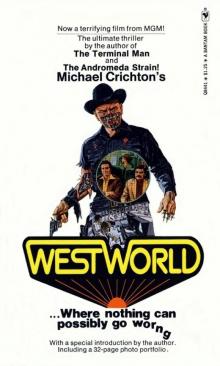 Delos 1 - Westworld
Delos 1 - Westworld